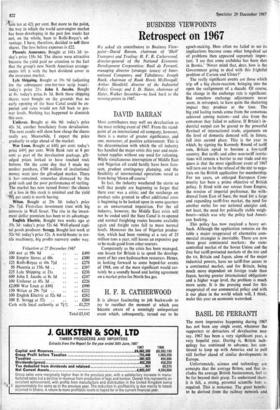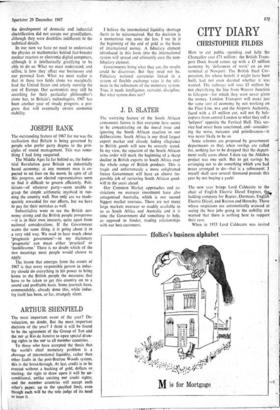Retrospect on 1967
BUSINESS VIEWPOINTS
We asked six contributors to Business View- point—David Barran, chairman of 'Shell' Transport and Trading: H. F. R. Catherwood, director-general of the National Economic Development Corporation: Basil de Ferranti, managing director (strategic issues) of Inter- national Computers and Tabulators: Joseph Rank, chairman of Rank Hovis McDougall: Arthur Shenfield, director of the Industrial Policy Group; and J. D. Slater, chairman pf Slater, Walker Securities—to look back to the turning-points in 1967.
DAVID BARRAN
Most contributors may well see devaluation as the most striking event of 1967. From the stand- point of an international oil company, however, there is a matter of greater significance, and one, moreover, of positive achievement. This is the determination with which the oil industry has handled the major crisis this year and main- tained supplies without any need for rationing. While simultaneous interruption of Middle East and Nigerian oil could hardly have been fore- seen, prudent contingency planning, and the flexibility of international operations saved us from being 'blown off course.'
In fact, the industry weathered the storm so well that people are beginning to forget that there ever was a crisis; and the surcharge on product sales granted to offset additional costs is beginning to be looked upon in some quarters as an unwarranted imposition. For the oil industry, however; the Middle East crisis will not be ended until the Suez Canal is re-opened and normal freighting routes become available again and freight rates fall to more normal levels. Moreover the loss of Nigerian produc- tion, which had been running at a rate of 25 million tons a year, still leaves an expensive gap to be made good from other sources.
Competently as the crisis has been managed, one lesson for Britain is to speed the 'develop- ment of her own hydrocarbon resources. Hence, in looking forward to some hoped-for events of 1968, one of the most significant would cer- tainly be a soundly based and lasting agreement on a market price for North Sea gas.
H. F. R. CATHERWOOD
It is always fascinating to job backwards to try to recollect the moment at which you became aware of a seemingly unimportant Total f5,142 event which, subsequently, turned out to be epoch-making. How often we failed to see its implications because some other long-dead set of problems then appeared supremely impor- tant. 'I see that some archduke has been shot in Bosnia.' Never mind that, dear, how is the Government going to deal with this frightful problem of Cation and Ulster?'
The really significant events are those which trip off a big chain-reaction. bringing into the open the realignment of a decade. Of course, the change in the exchange rate is significant. But somehow exchange adjustments never seem, in retrospect, to have quite the shattering impact they produce at the time. The big and lasting trends come from the consensus achieved among nations—and also from the consensus they failed to achieve. If Brtain's in- dustrial output can be geared to the powerful flywheel of international trade, arguments on the level of domestic demand will, in future, fall into second place. This is the year in which, by signing the Kennedy Round of tariff cuts, Britain opted to become a low-tariff country. But tariffs and other non-tariff restric- tions will remain a barrier to our trade and my guess is that the most significant event of 1967 will turn out to be the refusal of the EEC to nego- tiate on the British application for membership. For ten years, an enlarged European Com- munity has been a prime objective of British policy. It fitted with our-retreat from Empire, the erosion of imperial preference, the with- drawal from East of -Suez, the need for a large and expanding tariff-free market, the need for another outlet for our national energies and, not least, the need for politically stable neigh- bours—which was why the policy had Ameri- can backing.
This policy • has now received -a heavy set- back. Although the application remains on the table a major reappraisal of alternative com- mercial strategies is inevitable. There are now three great continental markets : the state- controlled market of the Soviet Union and the free but tariff-protected markets of the EEC and the us. Britain and Japan, alone of the major industrial powers, have no tariff-free access to a continental market, and for Britain, being much more dependent on foreign trade than Japan, having greater international obligations and a higher wage level, the problem is much more acute. It is the pressing need for this reappraisal of our commercial policy and with it our place in the world which will, I think, make this year an economic watershed.
BASIL DE FERRANTI
The most impressive happening during 1967 has not been any single event, whatever the supporters or detractors of devaluation may say. 1967 has been a very significant year, a very hopeful year. During it, British tech- nology has continued to advance, has con- tinued to keep up with America and to pull still further ahead of similar developments in Europe.
Unfortunately, science and technology are concepts that the average Briton, and that in- cludes the average British businessman, feel to be far beyond their grasp. To understand them. it is felt, a strong, personal scientific bent required. This is nonsense. The great benefits to be derived from the railway network and the development of domestic and industrial electrification did not escape our grandfathers, although they were doubtless indifferent to the technical details.
In our turn we have no need to understand the physics or mathematics behind fast-breeder nuclear reactors or electronic digital computers, although it is intellectually gratifying to be able to do so. What we must understand, and utilise, is how they affect our businesses and our personal lives. What we must realise is that in these two fields alone we marginally lead the United States and utterly outstrip the rest of Europe. Our economists may still be searching for their particular philosopher's stone but, to Britain's technologists, 1967 has been another year of steady progress; a pro- gress that will eventually ensure economic stability.
JOSEPH RANK
The outstanding feature of 1967 for me was the realisation that Britain is being governed by people who prefer party dogma to the prin- ciples of sound management. This was some- thing I had long suspected.
The Middle Ages lie far behind us, the Indus- trial Revolution gave Britain an industrially based economy; at any moment man is ex- pected to set foot on the moon. In spite of all this progress, our elected representatives seem to find it difficult to govern efficiently. Poli- ticians—of whatever party—seem unable to grasp the simple arithmetic involved in run- ning the country well. Not only are we inade- quately rewarded for our efforts, but we have to pay for their mistakes as well.
Industrialists want to -see the British eco- nomy strong and the British people prosperous —it is in their own interests, quite apart from national considerations. If the Government wants the same thing, it is going about it in a very odd way. We used to hear much about `pragmatic - government'—in my dictionary `pragmatic' can mean either 'practical' or `meddlesome.' There is no doubt which of the two meanings most people would choose to apply.
The lesson that emerges from the events of 1967 is that every responsible person in indus- try should do everything in his power to bring home to the British people the measures that have to be taken to get this country on to a sound and profitable basis. Some journals have, commendably, already done this, while indus- try itself has been, so far, strangely silent.
ARTHUR SHENFIELD
The most important event of the year? De- valuation, no doubt. But the most important decision of the year? I think it will be found to be the agreement of the Group of Ten and the. IMF at Rio-de Janeiro to open special-draw- ing rights in the IMF to all member countries.
To those who have accepted• the thesis that the world's chief monetary problem is a shortage of international liquidity, rather than other faults in the post-Bretton Woods system, this is the breakthrough. At last, credit is to be created without a backing of gold, dollars or sterling: the right to draw upon it will be un- conditional, unlike existing IMF credit rights; and the member countries Will accept each other's -paper, up to the specified limit, even though each will be the sole judge of its need to issue it.
I believe the international liquidity shortage thesis to be misconceived. But the decision is a momentous one none the less. I see in it the beginning of the end of gold as the basis of international money. A fiduciary element introduced in this form into the international system will spread and ultimately oust the non- fiduciary element.
Governments being what they are, the results could be disastrous. But they need not be. Fiduciary national currencies linked in a system of flexible exchange rates is the ulti- mate in the refinement of the monetary system. True, it needs intelligence, restraint, discipline. But what system does not?
J. D. SLATER
The worrying feature of the South African armaments furore is that everyone here seems to be concentrating on the moral issue and ignoring the South African reaction to our deliberations. South Africa is our third largest export market and already fading allegiance to British goods will now be severely tested. In my view, the rejection of the South African arms order will mark the beginning of a sharp decline in British exports to South Africa over the whole range of British products. This is tragic and unfortunately a more enlightened future Government will have an almost im- possible job of retrieving South African good- will in the years ahead.
Our Common Market approaches and re- strictions on overseas investment have also antagonised Australia, which is our second biggest market overseas. There are not many large markets overseas so readily available to us as South Africa and Australia and it is time the Government did something to help, as opposed to hinder, trading relationships with our best customers.











































 Previous page
Previous page